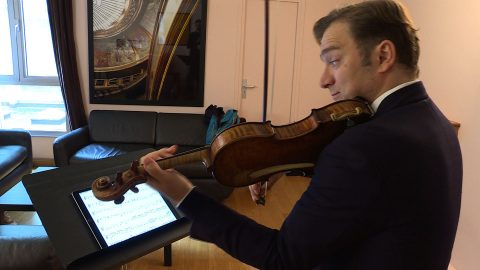
Aix-en-Provence, France (AFP) – It’s a musician’s dream — rehearse alongside a full orchestra, but in your own living room.
And the immersive experience is possible because, yes, there’s an app for that, courtesy of a French start-up, Digital Music Solutions.
“NomadPlay” is all down to an algorithm which separates out the sound components of a score to remove any instrument as desired, fading out an oboe or piano part for instance, and allowing the home musician to join the fray.
“When we were young we all practised with records to get the impression we were playing along with the Vienna or Berlin philharmonic. That was very gratifying,” internationally-renowned French violinist Renaud Capucon, 43, told AFP.
“But it was a nightmare when our parents heard us play because it just wasn’t the same thing!”
Now, thanks to the app, “you’re accompanied by an orchestra all on your own in your room — it’s extraordinary.”
Clothilde Chalot and Hannelore Guittet started Digital Music Solutions in Paris five years ago.
Their app can be downloaded for free on a phone or tablet and offers a catalogue of albums, ranging from Beethoven’s Fifth Symphony to Schubert’s Fantasia in F Minor.
Amateurs and professionals buy the pieces for between five and 20 euros ($5.60-$22.50).
– Karaoke style –
Capucon, the app’s “ambassador,” offered AFP a demonstration of its capabilities at the Festival de Paques in the southern town of Aix-en-Provence in April.
Taking Ravel’s string quartet, he clicked on the violin symbol to eliminate the sound of the part, before accompanying the piece with his own instrument.
The concept is similar to that of karaoke, where fans grab the mic to provide their own vocals to the original backing track.
Yet the NomadPlay app is more elaborate.
First off, you can search by level — beginner, intermediate, experienced or expert — or by instrument, as well as by composer.
You can increase or slow down the tempo, repeat a bar or part of a bar and even annotate the score.
Capucon says the app is brimming with educational promise as it can help budding musicians “learn a work more quickly with this harmonic help.”
For professionals such as himself, the system offers a “huge time gain” as “when finally you practise with the others, you already have the reflexes”.
– Emulate Rostropovich? –
He does concede, however, that the app per se will not transform the user into a musical genius.
“It’s not going to turn you into a (Yehudi) Menuhin or (Mstislav) Rostropovich”.
Indeed “if the pupil only works with the app you could say it’s dangerous… but from the point of view of speeding up the job, it is very positive,” said Capucon.
For Marc Bourreau, a teacher and lecturer at engineering college Telecom ParisTech, applications dedicated to music, be it for listening, micing or editing, have become ever more sophisticated.
“This digitally-pushed evolution eliminated the frontier between creator/artist and consumer,” he said.
In an age where “children grow up with their tablets you have to give music this technological and entertaining side to spark their interest,” added Dominique Bluzet, executive director at the Festival de Paques.
Bluzet says concerts these days are no longer the only way to introduce young people to music.
NomadPlay is already working with the Strasbourg Philharmonic Orchestra, National Orchestra of France’s Ile de France region around Paris and their Rouen-Normandy equivalent.
It hopes to extend its repertoire by September to include scores played by a broader range of ensembles.
“We shall be able to try out the tempo of different conductors (and offer) preparation which affords musicians greater flexibility,” Capucon said.
– Practise anywhere –
Chalot says the app can offer discs a second life.
“We wanted to find a new economic model for recorded music which has been around for 100 years,” said the 38-year-old, who has worked at the Paris Opera and the Rouen-Normandy Opera.
“We tell independent and major labels that ‘this is also a way of getting your artists known’,” said Chalot.
Around a dozen people worked on the app, whose creation was partly funded by the CM-CIC Innovation investment fund and French culture ministry.
“The day we ran the first tests I cried. It was magnificent,” Chalot recalled.
To date, the catalogue is purely classical music but the company says it is in talks with independent pop and rock producers as it looks to “open up to all genres.”







